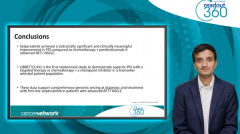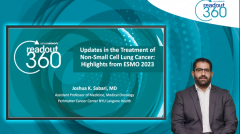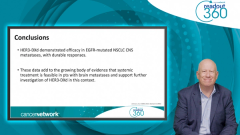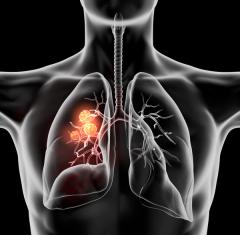
TROPION-Lung05: Dato-DXd in Previously Treated NSCLC
An expert on lung cancer discusses data from TROPION-Lung05 on datopotamab deruxtecan in patients with previously treated NSCLC with actionable genomic alterations.
Episodes in this series

This is a synopsis of a Readout 360 series featuring Sandip P. Patel, MD, of UC San Diego Moores Cancer Center; Joshua K. Sabari, MD, of NYU Langone’s Perlmutter Cancer Center; and Alexander I. Spira, MD, PhD, FACP, of Virginia Cancer Specialists.
Joshua K. Sabari, MD, a thoracic medical oncologist at NYU Langone Health Perlmutter Cancer Center, discussed the TROPION-Lung05 study, which evaluated datopotamab deruxtecan (Dato-DXd) in previously treated non-small cell lung cancer (NSCLC) patients with actionable genomic alterations. The abstract was presented by Dr. Paz-Ares.
Dato-DXd is a novel antibody-drug conjugate directed against TROP2, which covalently links to a topoisomerase 1 inhibitor payload via a stable, tumor-selective, tetrapeptide-based cleavable linker. The TROPION-Lung05 study was a global, open-label, phase 2, single-arm trial that evaluated Dato-DXd in patients with advanced or metastatic NSCLC harboring actionable genomic alterations (EGFR, ALK, ROS1, NTRK, BRAF, MET exon 14, or RET) who had progressed on one or more lines of therapy, including platinum-containing chemotherapy.
Key exclusion criteria included prior treatment with a TROP2-directed therapy, symptomatic brain metastases, uncontrolled or significant cardiovascular disease, or any active history of interstitial lung disease (ILD) or pneumonitis. All patients received Dato-DXd at 6 mg/kg, administered intravenously once every three weeks. The primary endpoint was the objective response rate (ORR) by RECIST, with key secondary endpoints including duration of response (DOR) and progression-free survival (PFS).
Among the 137 patients enrolled, the median age was 61 years, 71.5% had received three or more lines of therapy, and 56% had EGFR mutations. The ORR for the total cohort was 36%, but notably, in patients with EGFR-activating mutations (exon 19 deletions or L858R), including those with T790M resistance, the response rate was 49%. However, the response rate for patients with ALK fusions was only 25%. The median DOR in all-comers was 7 months.
The safety profile of Dato-DXd was consistent with prior reports, with 10% of patients experiencing grade 3 or greater stomatitis, 5.8% having grade 3 or greater anemia, and 5.8% having a grade 3 or greater increase in amylase. The dose reduction rate was 21.9%, and the dose discontinuation rate was approximately 10%. The death rate in this patient population was 1.5%.
Dr. Sabari concluded that Dato-DXd showed encouraging antitumor activity with clinically meaningful and durable responses in heavily pretreated NSCLC patients with actionable genomic alterations. The safety profile was manageable and consistent with prior observations. These data support the inclusion of patients with actionable genomic alterations in the TROPION-Lung01 study.
*Video synopsis is AI-generated and reviewed by Cancer Network editorial staff.
Newsletter
Stay up to date on recent advances in the multidisciplinary approach to cancer.








































